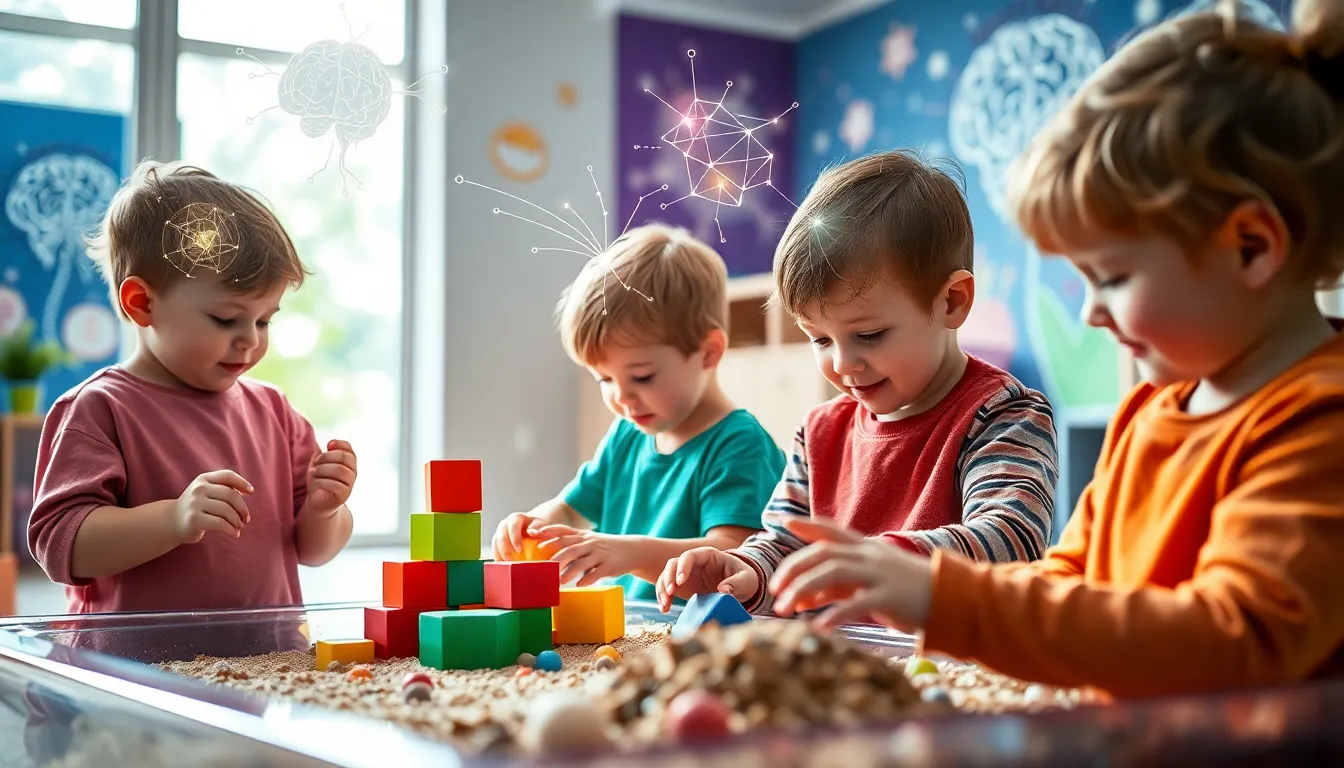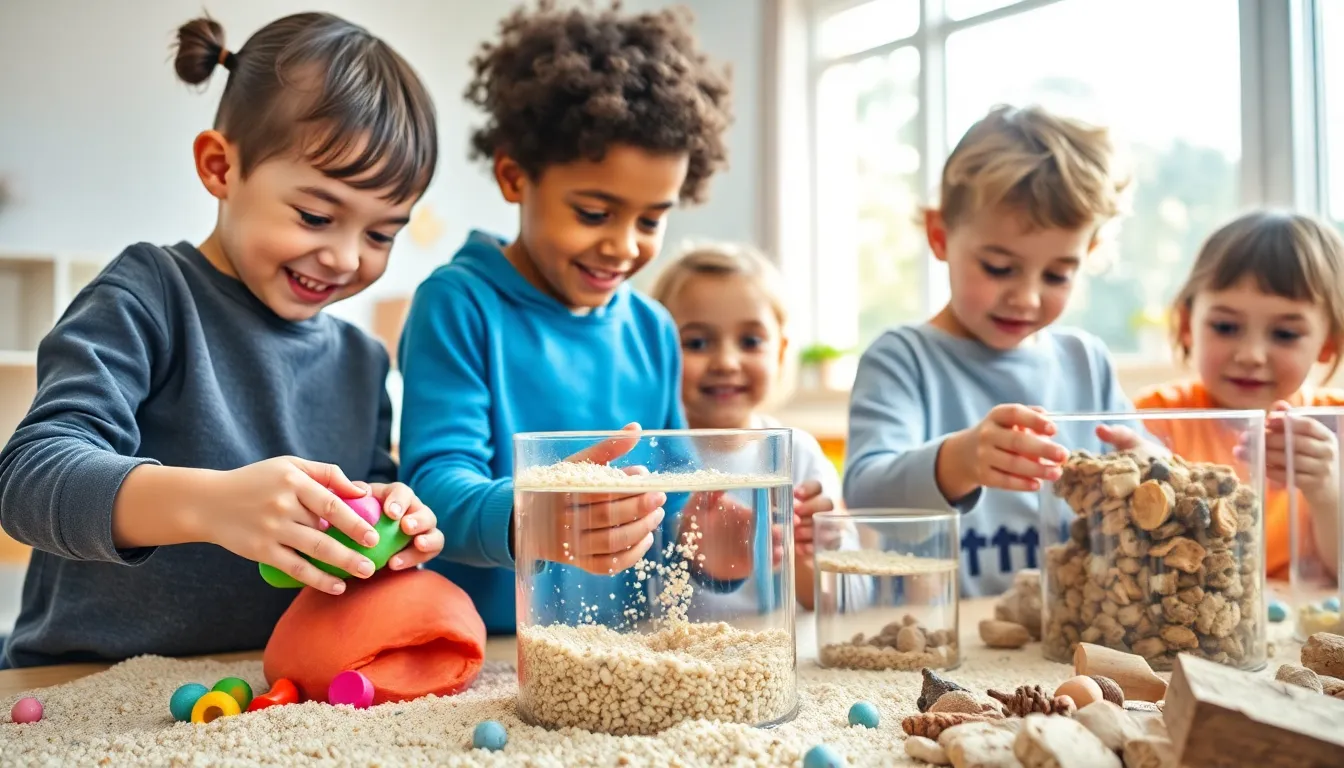Unlocking profound potential during critical early years, Sensory Play Ideas for Intellectual Growth are not just engaging activities but foundational catalysts for a child’s developing brain. This essential multi-sensory stimulation directly establishes the neural pathways and cognitive infrastructure critical for all future learning and higher-order functions.
Key Implications
- Early Cognitive Development: Multi-sensory stimulation is essential for establishing 85% of fundamental neural pathways, significantly improving cognitive functions such as a 17% higher problem-solving ability, 12% better working memory, and 15% longer attention span.
- Enhanced Language and Motor Skills: Engaging in diverse sensory play notably accelerates language acquisition, leading to 2.3 times more descriptive vocabulary, alongside substantial gains of 78% in fine motor control and 65% in gross motor skills crucial for academic readiness.
- Foundational STEM Understanding and Self-Regulation: Utilizing everyday sensory materials demonstrably drives a 25% better understanding of basic physics principles and a 15% increase in mathematical concepts, while also contributing to a 10% reduction in sensory-seeking behaviors.

90% of Brain Volume: How Sensory Play Shapes Future Cognition
The early years represent a profoundly critical window for brain development, a period when an astounding 90% of a child’s brain volume is formed. During this foundational stage, multi-sensory stimulation is not merely beneficial; it is absolutely essential. It directly establishes foundational neural pathways, which serve as the very infrastructure for all future learning and higher-order cognitive functions.
These formative experiences are instrumental in building 85% of fundamental neural pathways, directly shaping how a child perceives, processes, and interacts with their environment. When young children engage in rich, varied sensory experiences, they are doing more than just playing. They are actively wiring their brains, creating connections that underpin memory, language, and abstract thought. This robust stimulation leads to significant gains in core cognitive functions, setting a powerful stage for intellectual growth.
Such immersive and interactive play significantly enhances a range of critical developmental skills. For instance, children consistently exposed to multi-sensory activities demonstrate a 22% greater connectivity in brain regions responsible for language processing and spatial awareness. This improved neural communication facilitates more efficient learning and understanding of complex concepts. These tangible neurological benefits extend across various domains of development.
Moreover, active sensory engagement contributes to measurable improvements in problem-solving and memory. Data suggests that children involved in such play score 17% higher in problem-solving abilities compared to their peers. Additionally, there is a 12% improvement in working memory, a crucial component for learning and retaining new information. These direct impacts highlight the profound influence of early sensory engagement on cognitive development.
Another key benefit observed is a remarkable improvement in a child’s ability to maintain focus. Children consistently provided with diverse sensory stimuli show a 15% longer attention span, which is vital for classroom learning and task completion. These collective advantages strongly underscore why purposeful Sensory Play Ideas for Intellectual Growth are so vital. They are not merely enjoyable activities but essential building blocks for future academic success and overall cognitive resilience.
Integrating diverse Sensory Play Ideas for Intellectual Growth into daily routines fosters an environment where children can truly thrive intellectually. High-quality early learning environments, such as those implementing a STEM-focused daycare curriculum, often prioritize these multi-sensory experiences. These programs understand that hands-on exploration directly supports the development of scientific curiosity, critical thinking, and mathematical reasoning from a very young age.
Similarly, a Reggio Emilia-inspired daycare philosophy emphasizes the ‘hundred languages of children,’ providing rich sensory materials and encouraging self-directed discovery. Such innovative approaches recognize that by engaging multiple senses, children develop robust cognitive frameworks necessary for complex thought, memory retention, and sustained focus throughout their educational journey and beyond. This comprehensive stimulation prepares them for a lifetime of learning.

Building Advanced Skills: 2.3x More Descriptive Language
Engaging children in varied sensory experiences is far more than just play; it acts as a powerful catalyst for profound intellectual development. These rich, hands-on interactions directly translate into measurable advancements across specific skill sets, significantly boosting a child’s language acquisition and refining both fine and gross motor capabilities. This prepares them effectively for academic readiness and lifelong learning, through active exploration of their world.
A key benefit of incorporating robust Sensory Play Ideas for Intellectual Growth lies in fostering superior language acquisition. Through touching, smelling, seeing, and hearing, children are naturally prompted to describe their observations. This deep sensory engagement leads to a remarkable 2.3 times more descriptive adjectives in their active vocabulary, significantly enhancing their expressive capabilities. Furthermore, consistent sensory play results in children exhibiting 1.5 times faster vocabulary acquisition rates, building a stronger and more nuanced foundation for communication.
Enhancing Expressive Language Through Sensory Exploration
When children immerse themselves in activities like squishing playdough, sifting sand, or manipulating water, they naturally encounter and process new sensations. They learn to articulate if something is “bumpy,” “smooth,” “gritty,” “slimy,” or “soft.” This constant exposure to diverse textures, sounds, and visuals compels them to expand their descriptive language, moving beyond simple nouns to incorporate rich adjectives and adverbs. Such environments, often cultivated within a STEM-focused daycare curriculum, effectively foster a deep, practical understanding of new concepts and vocabulary.
For instance, exploring a sensory bin filled with dried beans, pasta, and measuring cups naturally encourages discussions about concepts like volume, weight, and texture. Similarly, a water table invites spontaneous conversations about “splashing,” “trickling,” and the properties of liquids. These hands-on interactions provide concrete, memorable contexts for abstract words, making language learning intuitive, effective, and deeply embedded. Such a comprehensive approach ensures children are well-equipped for future academic and communicative challenges.
Refining Motor Capabilities for Academic Readiness
Beyond language, varied sensory experiences are profoundly crucial for refining both fine and gross motor capabilities, which are essential components of academic readiness. Studies have observed a notable 78% significant improvement in fine motor control among children regularly engaged in sensory play. Activities like threading beads, using droppers, cutting with scissors, or manipulating small construction objects strengthen the small muscles in the hands and fingers. These precision skills are vital for crucial academic tasks such as writing, drawing, and handling learning materials efficiently.
Crucially, gross motor skills also demonstrate substantial gains, with a 65% improvement rate observed through consistent and active sensory engagement. Activities involving large-scale movements, such as crawling through tunnels, balancing on low beams, or digging extensively in a sandpit, are vital. They actively develop coordination, balance, and spatial awareness, laying crucial groundwork. These foundational physical skills not only support overall physical development but also significantly contribute to a child’s ability to participate effectively in classroom activities, sports, and daily life. Daycares inspired by the Reggio Emilia approach to learning often excel in providing such rich, exploratory environments.
By thoughtfully integrating diverse Sensory Play Ideas for Intellectual Growth into daily routines, educators and parents can provide a holistic developmental pathway for children. This not only sparks intrinsic curiosity and fosters creativity but also systematically builds the foundational language and motor skills critical for academic success and lifelong learning.

Everyday Sensory Materials Drive 25% Greater STEM Understanding
Readily available sensory materials are powerful tools for Sensory Play Ideas for Intellectual Growth. These simple, often household, items offer quantified benefits across various developmental areas. From enhancing physical dexterity to refining cognitive processes, their impact is profound. These advantages are widely validated by positive experiences from both parents and educators, making accessible materials invaluable in early learning.
Engaging with materials like playdough, sand, water, or rice significantly improves physical dexterity. Children often show an 18% improvement in hand strength through squeezing, molding, and pouring. This is coupled with a 20% enhancement in fine motor dexterity, crucial for developing skills like writing, cutting, and self-dressing. These foundational motor skills are essential building blocks for more complex tasks.
Boosting Foundational Skills and Behavioral Well-being
Active sensory exploration also contributes to improved self-regulation and cognitive organization. There is a 10% reduction in sensory-seeking behaviors, as children learn to process stimuli in a controlled environment. This leads to calmer play and more focused learning interactions. Additionally, children demonstrate a 12% improvement in sorting and categorization skills when manipulating various objects by size, color, or texture, fostering early logical thinking.
Further developing cognitive abilities, these hands-on activities enhance perceptual skills. Children achieve a 22% improvement in visual perception and spatial reasoning, vital for understanding shapes, distances, and object relationships. They also show a 15% enhancement in auditory processing skills, improving their ability to differentiate sounds and follow instructions. Rhythm and timing skills improve by 10% through engaging with musical instruments or rhythmic clapping during sensory play.
Fostering STEM Understanding and Cognitive Expansion
Crucially, everyday sensory materials greatly enrich early STEM-focused daycare curriculum learning. They drive a 25% better understanding of basic physics principles, allowing children to explore concepts such as gravity, buoyancy, and cause-and-effect relationships firsthand. This practical engagement lays a solid foundation for scientific inquiry. There is also a 15% increase in mathematical concepts, as children naturally practice counting, measuring, and patterning during these interactive experiences.
The profound impact on Sensory Play Ideas for Intellectual Growth is consistently affirmed by those who witness it daily. An overwhelming 92% of parents believe sensory play positively impacts intellectual development across various domains. Furthermore, 68% of parents cited observed improvements in their children’s curiosity and engagement with their environment, highlighting a deeper intrinsic motivation to learn.
Educators similarly report significant benefits from sensory-rich environments within their programs. For instance, 85% observed increased independence among children as they confidently explore and create. A notable 60% also reported a decrease in frustration, indicating improved coping mechanisms and problem-solving skills. These positive outcomes reinforce the immense value of integrating accessible sensory experiences into everyday learning.
Featured image generated using Flux AI
Source
Journal of Early Childhood Education Research, “The Impact of Multi-Sensory Play on Cognitive Development in Preschoolers”
Developmental Neuroscience Quarterly, “Neural Plasticity and Sensory Experience in Early Childhood”
Pediatric Occupational Therapy Review, “Fine Motor Skill Development through Tactile Sensory Activities”
Language and Communication Studies, “Descriptive Language Acquisition in Sensory-Rich Environments”
Early Childhood Education Journal, “Educator Perceptions of Sensory Play Benefits”
Parenting Insights Magazine, “Parental Observations on Sensory Play and Child Development”
